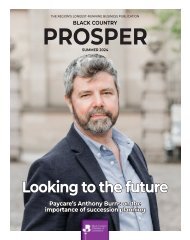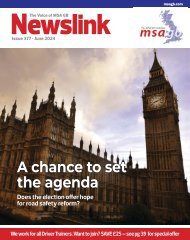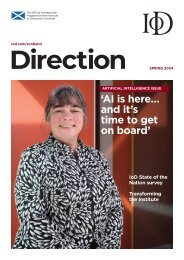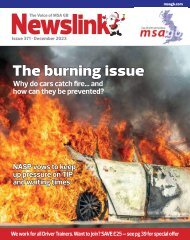IoD Scotland Autumn 2021
Institute of Directors Scotland, business magazine, directors
Institute of Directors Scotland, business magazine, directors
You also want an ePaper? Increase the reach of your titles
YUMPU automatically turns print PDFs into web optimized ePapers that Google loves.
Leadership Interview: Professor Mark Logan<br />
Don’t let us fall<br />
into the tragedy<br />
of inaction<br />
Renowned tech entrepreneur Professor Mark Logan talks to <strong>IoD</strong> <strong>Scotland</strong>’s<br />
Rob Beswick about <strong>Scotland</strong>’s digital future, the challenge of climate<br />
change and why we’re trapped in a modern day ‘tragedy of the commons’<br />
By nature, you would suspect Professor<br />
Mark Logan is something of an optimist.<br />
Certainly, when pressed on the<br />
possibilities open to <strong>Scotland</strong>’s<br />
flourishing digital tech sector, his vision<br />
is one that could have Silicon Valley’s<br />
giants nervously glancing over their<br />
collective shoulders as he maps out a<br />
route that could see <strong>Scotland</strong> boast ‘a<br />
hundred Skyscanners’.<br />
But turn the conversation to the fight<br />
against climate change, and the tone is<br />
more pessimistic.<br />
It’s easy to see why. The biggest<br />
smoking gun of a generation was fired<br />
in August with the release of the IPCC<br />
report on climate change, and as Mark<br />
points out, “the story was gone from the<br />
main news channels within 48 hours.”<br />
“We’ve just had the biggest wake-up<br />
call we’ve ever had on a single issue and<br />
within two days the media spotlight had<br />
moved on, like it was just one more story<br />
to think about, discuss and gloss over.<br />
We’ve got to wake up to the catastrophe<br />
we’re facing.”<br />
That wasn’t the only thing that worried<br />
him, either: “The lack of a coherent and<br />
proportionate response from governments<br />
around the world is terrifying. We are at<br />
war with our own path dependence; with<br />
our vested interests, our sunk costs and<br />
our failure to comprehend exponential<br />
change.”<br />
Our common response, he says, is<br />
instead to turn to technology, looking for<br />
easy salvation. “Technology certainly<br />
contains the seeds of the solution, but<br />
right now the tech industry is even a net<br />
accelerator of carbon consumption.<br />
We’re using new technologies to bring<br />
oil fields that were not previously viable<br />
into use; we celebrate blockchain, but its<br />
first major application, bitcoin, uses<br />
more electricity than an average<br />
European country. And for what?<br />
Financial speculation.”<br />
If the tech sector is going to help<br />
<strong>Scotland</strong> to ‘net zero’, however, you can<br />
bet Mark will play a key role. The former<br />
Chief Operating Officer of Skyscanner<br />
and before that VP of engineering at<br />
Atlantech, a Scottish software business<br />
sold to Cisco for $180m in 2000, and a<br />
founding member of big data start-up<br />
Sumerian, Mark is an expert in scaling<br />
digital businesses. His independent<br />
review of the Scottish tech ecosystem<br />
led to him being asked by the Scottish<br />
Government to head a post-pandemic<br />
tech-led recovery, with a goal of<br />
establishing <strong>Scotland</strong> as a world-class<br />
technology hub.<br />
And just in case he didn’t have enough<br />
on his plate, he is also the Professor of<br />
Computing Science at the University of<br />
Glasgow and involved in a number of<br />
other digital operations.<br />
A busy man, but with a track record of<br />
building world-class digital enterprises in<br />
a country that hitherto was not seen as a<br />
global player, it’s easy to see why he is in<br />
such demand.<br />
It certainly kept him busy during the<br />
past 18 months as the world got to grips<br />
with Covid-19. “I had a lot of work to do<br />
so the first wave of the pandemic I dealt<br />
with fairly well. The second wave was<br />
different; like many people I felt very<br />
uncomfortable over the winter lockdown.<br />
I realised I was more of a social animal<br />
than I had previously realised!”<br />
While health-wise the pandemic left<br />
him largely untouched, on the business<br />
side he saw the impact of lockdowns at<br />
close quarters. “To take one example, I<br />
do a lot of work with start-ups and many<br />
struggled severely, and are still<br />
struggling. They’ve lost markets through<br />
no fault of their own and it was heartbreaking;<br />
a really painful experience.”<br />
Part of the challenge was the<br />
uncertainty. “I like to know the path I’m<br />
following and my direction of travel. We<br />
didn’t have that in the past 18 months as<br />
we were never sure what would happen<br />
next, and when it would all end.”<br />
What the pandemic did do was remind<br />
Mark of how vulnerable we are as a<br />
society, and here he sees strong parallels<br />
with climate change. “Covid-19 showed<br />
us how disasters can develop<br />
exponentially. What looked to many like<br />
a smallish, localised issue became a<br />
global catastrophe in a matter of weeks.<br />
That’s what happens when the exponentials<br />
kick in. Covid-19 is a harbinger of what is<br />
happening with climate change; once the<br />
balance is tipped against us, we will be<br />
overwhelmed by the consequences. It’s<br />
later than we think.”<br />
The pandemic brought with it huge<br />
changes in how businesses operated,<br />
with the growth of working from home.<br />
Many were surprised by how well the<br />
change went, but it was second nature to<br />
Mark. “Perhaps people didn’t realise they<br />
had everything they needed to keep the<br />
wheels turning; the equipment and skills<br />
for home working were well-established.<br />
The only thing we had to do was break<br />
people’s ingrained habits and beliefs<br />
– that it was essential to commute to an<br />
12 iod.com<br />
<strong>Autumn</strong> <strong>2021</strong>

















